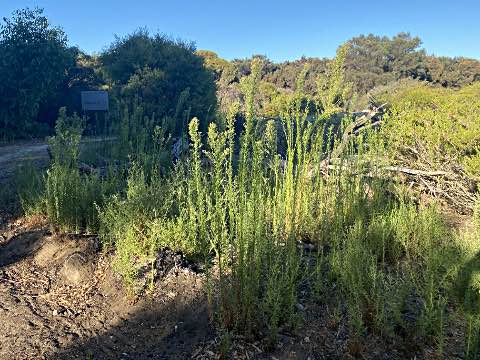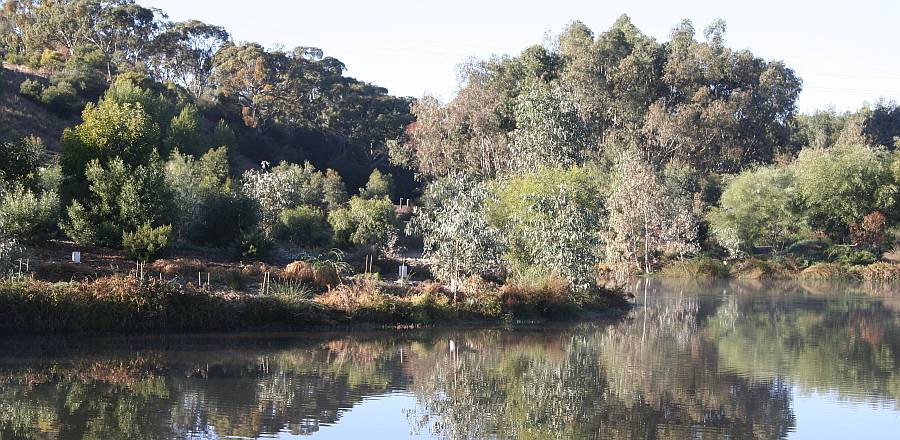|
Community spirit
The reader can look up the definition of community spirit in various online dictionaries or Wikipedia. For the purpose of this page I will define it as a willingness or desire to contribute to one's community without necessarily expecting anything in return, although most would hope for gratitude.I see many who do demonstrate community spirit, but unfortunately I seem to see more who just look after themselves.
|
There is a shortage of community spirit and civic pride in Australia
At the time of writing this section of this page my wife and I had just returned home from a few days on South Australia's Yorke Peninsula. We spent some time strolling in a number of the public garden areas in the towns on the peninsula, as many tourists would do. The gardens varied from older ones that were badly neglected to new ones beautifully planned and laid out, but perhaps the point that we noticed more than any other was that almost all of them, even the new ones, needed a bit of TLC (tender loving care).In Maitland, in about the middle of the peninsula, while walking in a park we noticed many people on the nearby golf course. Plainly there was no shortage of people with leisure time. An hour's work weeding from one or two people a couple of times a week would make a huge difference to the town's public gardens. The same could be said for most of the towns we visited.
The labours of a small handful of volunteers has turned what was mostly a patch of marshmallows into one of Clare's greatest assets (see Lions Gleeson Wetlands) and there is also a voluntary labour effort to turn a patch of wasteland in the middle of Crystal Brook into a nice park (see Crystal Brook's Central Park).
- "Never doubt that a small group of thoughtful committed citizens can change the world; indeed, it's the only thing that ever has."
- Margaret Mead, American Anthropologist (1901 – 1978)
|
|
I suspect that many would say "It's the local government's job to look after the public gardens. Let them do it." But how many of us want to pay higher rates and taxes to cover the cost?
|
Why stop at your property boundary?
When I walk around my neighbourhood I see many gardens that are immaculately cared for, but just outside of the property boundary there may be weeds and rubbish.
This surely is a sign of a selfish outlook. Why do people's concern for their surroundings stop at their front fence? Why not do something for your community as well as yourself?
Why not pull a few weeds out of the public places around you home? Why not pick up some of the rubbish that others leave in public places? That sort of thing is what contributing to your community is all about.
What do various people contribute to society?
People of limited means are forced to work for a living for themselves and for their children; their income producing work and the responsible raising and education of their children is a large part of their contribution to society.The wealthy may make a contribution, a few make a great contribution, but they do not need to make a personal contribution to society in order to live comfortably; and I hold that many of them make a negative contribution by using their wealth to corrupt government and disrupt the proper functioning of society for personal gain and that, further, this is a crime against humanity.
As individuals our consumption is largely proportional to our income and our adverse impact on our environment is largely proportional to our consumption. Consumption is a negative contribution to environment and hence society. The greenhouse emissions we are responsible for are closely related to our consumption.
In the West many older people spend a lot of time in retirement. This is a part of life in which there is great opportunity to make contributions to our communities and our world.
While this page deals more with the contribution that can (and should) be made by 'ordinary people' I believe that the broader subject is one that needs to be discussed by those interested in ethics in our society.
|
|
Contribution
|
With capitalism, a person who has capital (perhaps in the form of a company that was inherited from his parents) does not need to make any personal contribution. He can sit back and receive all he needs from the contributions of other people. Where is the justice in this?
Even if that person built up the business himself, once it is built up he can donate money and feel he or she need no longer make a personal contribution to society.
A personal contribution
Donating blood or plasma (photo on the right) is an example of a personal contribution. At the time I took the photo I was told that only one in thirty Australians donate blood or blood products, yet it is easy, takes only an hour or so and is practically painless.The "sweat of one's brow"?
In my community I see several very different types of contribution toward getting things done at the community level:- there are those who provide funds or materials for projects;
- there are those who chase donations or grants to pay someone else to work and cover the costs of the materials needed for that work;
- there are those who are active in the organisational side of organisations such as Lions, Apex, Rotary, etc., etc., spending a lot of their time going to meetings on local, regional, state and perhaps even national level.
- and there are those who go and do the work on the ground themselves, perhaps independently of any organisation and perhaps at their own expense.
|
Contrast – the wealthy capitalist and the volunteer
The wealthy person donating some of his ample money can be contrasted to the millions of volunteers who mostly have very limited financial means but give massively of their time to help other people and to do good works generally.See also my page on Corporate greed.
|
|
Positive contribution
I should at least mention the positive contributions made by many people, far too many for me to list, but I will list a few who come quickly to mind, in no particular order: Bertrand Russel, Peter Singer, David Attenborough, Richard Dawkins, Tim Flannery, Jeremy Bentham and the many great (and less great) scientists, several who I've listed in my page on Milestones in the development of human society. I've written of a few others under the good people and there are others of my personal acquaintance.Lack of contribution
Unfortunately the great majority of people make no effort, or at best a negligible effort, to reduce their greenhouse emissions.
For example, on my Environment page I have a piece about travelling by bus as an alternative to using a private car. An estimate I made was that on a main road near my house less than one percent of those using that road travelled by bus.
All reasonably informed people should know by the time of writing that travelling by public transport is less environmentally damaging, in terms of greenhouse and air pollution emissions, than travelling by private cars.
Yet it seems that in the community in which I live very few care enough to take the little extra trouble to use the good bus service that is available to us.
Negative contribution
Most people probably try, although they might not try very hard, to make a positive contribution to the society and community in which they live, but then there are those who, either through laziness or intention actively harm their communities and damage the world we all share.Minor negative contributors
Perhaps the most common of the minor negative contributors are those who throw their rubbish anywhere that suites them. I've written on cleaning up this rubbish on another page on this site.An interesting observation I've made over the years is that at least quite a few of these people at least have the minimal amount of decency to not throw their rubbish in front of someone's house, they instead throw it out when they go past a park or reserve. (If this can be called 'decency' at all?)
At least one step higher up the scale of negative contributors are the vandals, those who deliberately damage public assets or the natural environment.
|
|
The big negative contributors
| ||
|
Those in control of fossil fuel companies such as Exxon have been publicly and very vocally denying anthropogenic climate change at the same time as being fully aware of the facts. Those who have big money invested in the status-quo are the ones who are most resisting the much needed changes away from fossil fuels toward renewable energy. Those who are keeping the coal industry going are responsible for millions of human deaths each year.
In my country, Australia, people like Gina Rinehart and Clive palmer are individually responsible for thousands of deaths each year resulting just from the air pollution from burning the coal that comes out of their mines, let alone their contribution to climate change.
Also, people consume more or less in proportion to their wealth and as consumption increases so do the resultant greenhouse emissions; so wealthy people are responsible for far more per-capita emissions than are poor people.
Another form of negative contribution is the conspicuous and irresponsible overconsumption and waste that we see in countries like Australia.
Minimising our negative contributors
While it may be unintentional, we all contribute negatively to our global community through our consumption, our waste and the emissions that we produce directly or indirectly.
Just as we have a responsibility to contribute positively, so we have a responsibility to minimise the harmful contributions that we make to the best of our ability.
How much income is enough?
My wife and I live in Australia. We own our home outright and we are in reasonably good health for our age (around 70). Our combined annual income is around $40-50k and we can live on this quite comfortably. If we had more we would not be more happy.The bosses of big corporations and the big capitalists such as Gina Rinehart and Clive Palmer, two of the wealthiest, most unethical and prominent Australians, have incomes in the millions of dollars per year. They do not needed anywhere near so much money; research has shown us that more money, beyond that sufficient for one's basic needs, does not lead to more happiness.
|
|
More money does not necessarily lead to more happiness
Research has shown that while people living in poverty may very well be unhappy, increasing wealth beyond having enough for one's basic needs does not lead to increased happiness.For example a research paper by Aaron Ahuvia, titled Wealth, consumption and happiness included a graph that indicated that beyond an income of about $15,000 a year (1973 values), happiness did not increase with more money.
Also see "Can money buy you happiness? It's complicated", The Conversation 2016/10/12, by Catherine Jansson-Boyd. Ms Jansson-Boyd says that while people in wealthy nations report being happier than those in poor nations, there is no difference in happiness between those in moderately wealthy and those in very wealthy nations.
In fact more material possessions might well lead to less happiness. The very wealthy will be continually concerned about the possibility of someone kidnaping a child, for example.
Too much?
A person generally spends in some sort of proportion to his income. Spending (not investing) generally involves consumption and excessive consumption is one of the main causes of the many environmental problems that the world has.Is stealing always wrong?
When one person has far more than he can ever need and another person doesn't have enough to feed his family, I would hold that it is justified for the poor person to steal sufficient from the wealthy to buy food and clothes and to pay his rent.How is it justified? If the poor man steals from the rich man he can feed his family – that is good for them. The wealthy man would not suffer because he would still have quite enough for his needs. He need be no less happy. The poor family gains, the rich man does not suffer.
You might reasonably ask: what if all the poor people stole from all the wealthy people? It might then come about that wealth of the world was more evenly spread; the wealthy would lose some of the power that they previously had from their money and the poor would live a little better.
Plainly, using the utilitarian justification above, for a man to steal from another who was little or no better off would not be justified.
You might reasonably say: isn't this advocating anarchy? Yes, it is, but perhaps some anarchy would be better for the world and for the great majority of the people than the present great disparity of wealth and power?
|
|
Attitude to wealth
The twenty-first century attitude to wealth seems largely to see it as something to be sought after and to see the wealthy as 'successful' and people to be admired and emulated.We should be despising the wealthy for their greed! We should be looking at how much good they could be doing if they were to put that wealth to work improving the lot of the poor or doing good works for the environment or other worthy causes. The wealthy are especially despicable when they use their wealth to corrupt the political system for purposes such as advancing the coal industry, when that industry is causing enormous harm to the planet through climate change.
In the USA (I am not generally an admirer of
the USA) there is at least a tradition of
philanthropy among the wealthy, but this seems to be largely lacking among
the wealthy in my country, Australia.
Making the world a better place
- "I aimed to make the Earth a better place – and failed miserably"
- Professor Harry Messell
In many ways the world is becoming a worse place year by year; see
How our
civilisation is unsustainable.
But we can all try to make the world a better place and, while the world
might still steadily become a worse place, our efforts will at least slow the
deterioration.
Contribution can provide a purpose for living
I suspect that most people, at least at some time in their lives, look for a purpose. While we are young we are learning and maturing. Later many of us have children and see our purpose as helping them develop into well rounded adults. A career can, I suppose, provide something of a purpose.
|
|
I believe that contributing to society, trying to make the world, or at least our community, a better place, can provide that purpose. And in finding that purpose we can become happier.



